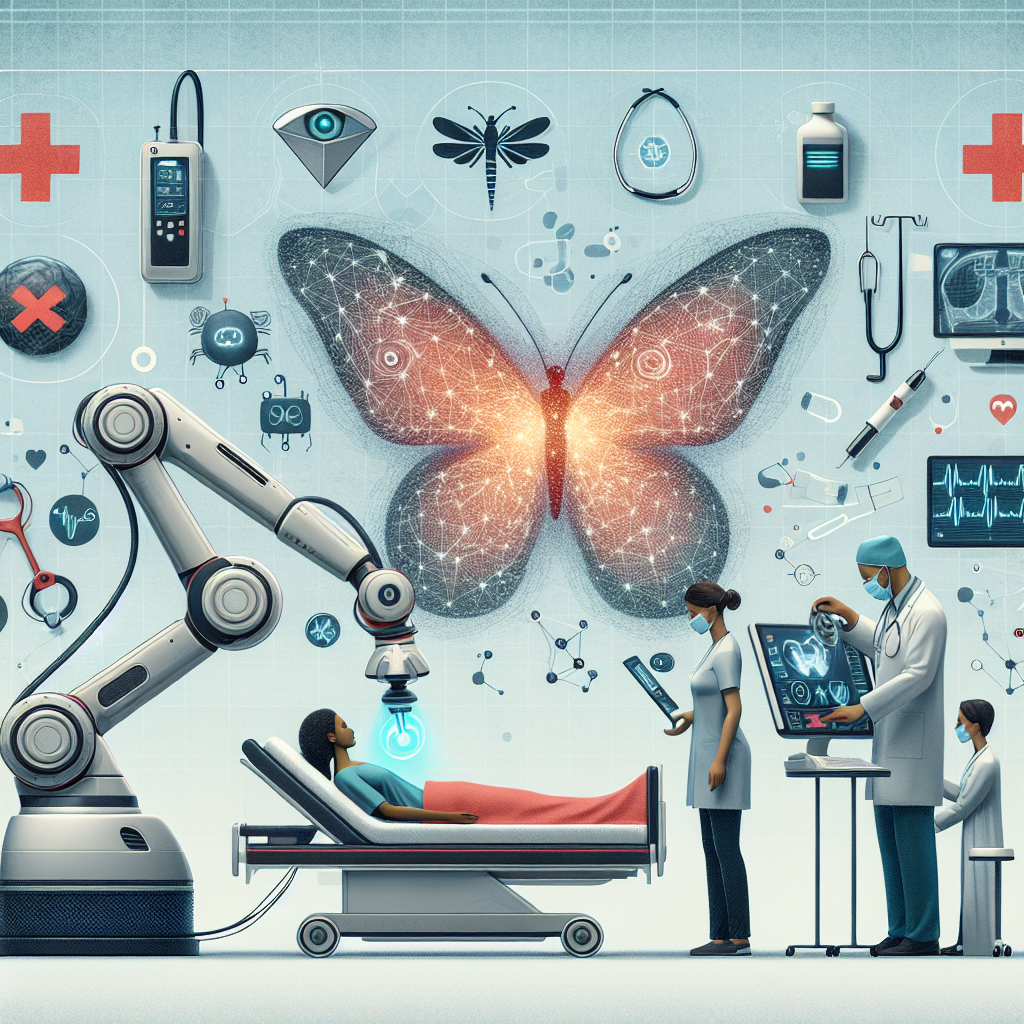Here’s the rewritten content with the HTML tags preserved:
<br />
<p>The incorporation of Artificial Intelligence (AI) within the healthcare sector has emerged as a revolutionary force, transforming our methods for diagnosis, treatment, and patient management. This shift signifies a notable change from conventional, often reactive care to proactive, data-driven strategies that improve patient outcomes.</p><br />
<h2>The Impact of AI on Diagnosis</h2><br />
<p>AI's influence on healthcare is particularly evident in its diagnostic capabilities. Machine learning algorithms evaluate extensive datasets, recognizing patterns that surpass human abilities.</p><br />
<h3>Early Detection</h3><br />
<p>AI technologies excel at the early detection of diseases. For instance, AI systems have shown exceptional precision in analyzing medical images, including X-rays and MRIs. Organizations like Zebra Medical Vision and Aidoc utilize AI algorithms to uncover anomalies that human radiologists might overlook, enabling earlier interventions and significantly enhancing survival rates for conditions such as cancer.</p><br />
<h3>Predictive Analytics</h3><br />
<p>Predictive analytics uses historical data to anticipate patient outcomes. By scrutinizing electronic health records (EHR), AI can pinpoint patients who are at elevated risk for conditions like diabetes or heart disease, facilitating proactive management. This not only boosts the likelihood of favorable health results but also lowers long-term healthcare expenses.</p><br />
<h2>Optimizing Treatment Strategies</h2><br />
<p>Following a diagnosis, AI plays a critical role in developing personalized treatment strategies.</p><br />
<h3>Personalized Medicine</h3><br />
<p>AI algorithms examine genetic, environmental, and lifestyle factors to suggest customized treatment options. Companies like Tempus lead the way, helping oncologists prescribe targeted therapies tailored to a patient’s genetic makeup. This personalized method reduces side effects while enhancing treatment effectiveness.</p><br />
<h3>Accelerated Drug Discovery</h3><br />
<p>AI has greatly expedited the drug discovery process. Traditional approaches can span years, even decades, to bring new medications to market. However, AI models can evaluate chemical compounds and predict their interactions with human biology in just months. Major pharmaceutical companies are leveraging this technology to identify promising drugs and streamline clinical trial processes, speeding up the availability of new therapies for patients.</p><br />
<h2>Improving Patient Engagement</h2><br />
<p>AI-driven innovations are not only transforming the diagnostic and treatment environments but also enhancing patient engagement.</p><br />
<h3>Digital Health Assistants</h3><br />
<p>Chatbots and digital health assistants empower patients to take control of their health proactively. These systems offer immediate answers to medical inquiries, medication reminders, and symptom-checking functionalities, boosting adherence and minimizing unnecessary visits to healthcare providers.</p><br />
<h3>Continuous Monitoring</h3><br />
<p>Wearable technologies, powered by AI, enable constant health monitoring. Devices that track heart rates, glucose levels, and other vital signs can notify healthcare providers of potential problems before they worsen. This approach not only enhances patient outcomes but also enriches the overall patient experience through timely interventions.</p><br />
<h2>Challenges and Ethical Considerations</h2><br />
<p>Despite AI's vast potential in healthcare, various challenges remain.</p><br />
<h3>Data Privacy and Security</h3><br />
<p>Given that AI heavily depends on data, patient privacy concerns are paramount. It is crucial to ensure secure and ethical data storage and usage. The development of regulatory frameworks and data governance policies must adapt to tackle these issues effectively.</p><br />
<h3>Importance of Human Oversight</h3><br />
<p>While AI can yield remarkable outcomes, it is not infallible. The human aspect is essential for interpreting AI-generated findings and making clinical decisions. Training healthcare professionals to collaborate with AI is critical to ensure that technology enhances rather than supplants human judgment.</p><br />
<h3>Equitable Access</h3><br />
<p>To prevent exacerbating existing health disparities, AI technologies must be accessible to diverse populations. Initiatives should be undertaken to ensure that AI-driven healthcare solutions are equitably available, especially in underserved communities.</p><br />
<h2>Conclusion</h2><br />
<p>AI is fundamentally changing the healthcare landscape, from diagnosis to treatment. By harnessing data's potential, healthcare providers can deliver personalized, efficient, and proactive care that improves patient outcomes. Although challenges persist, the ongoing integration of AI into patient care is forging a path toward a healthier future, emphasizing not only the treatment of illnesses but also the holistic well-being of patients worldwide. As this technology continues to progress, the healthcare sector stands ready for a revolution that is set to redefine the patient care journey for generations to come.</p>
